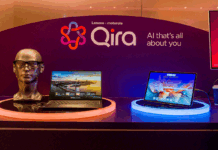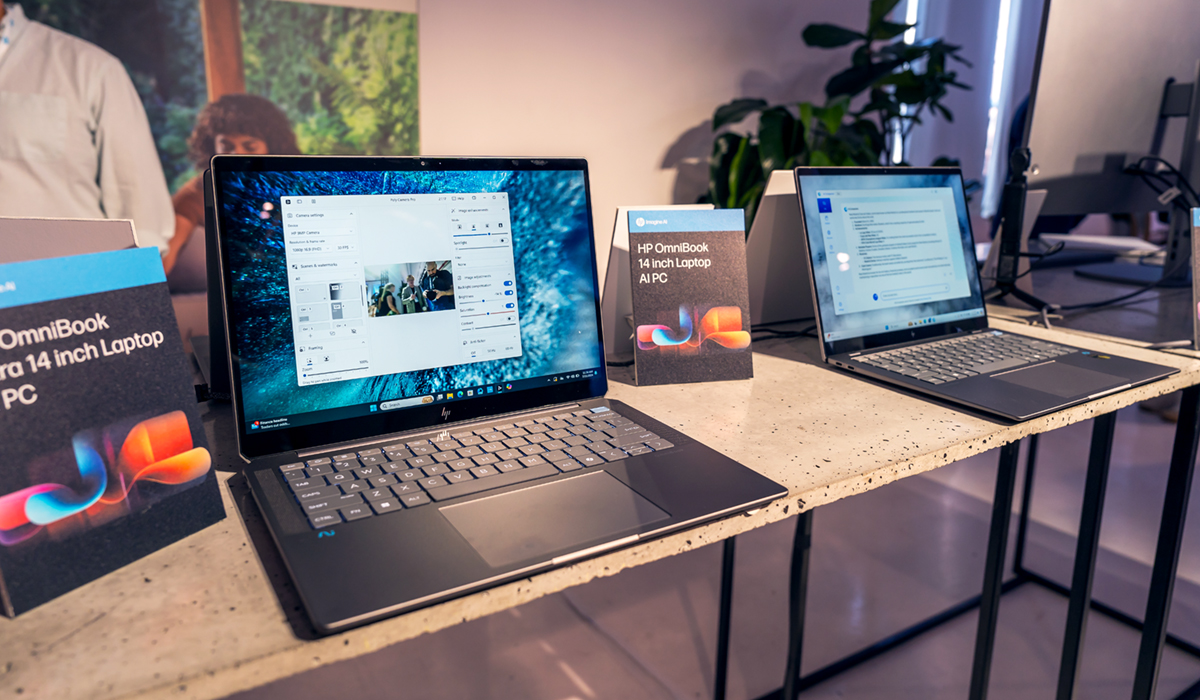
HP will launch a slate of OmniBook laptops and desktops equipped with a new AI platform designed to increase both trust and productivity. For now, at least, HP claims the new OmniBook 14 Ultra is “the world’s highest performance AI PC” with a robust neural processing unit (NPU).
The combination promises to usher in effective ways to both create and consume content. While the initial focus will be on HP’s more high-end laptops, the company says it’s committed to bringing its Companion AI and other automated tools to its broader consumer portfolio. HP demoed the new computers and AI platform at an event in New York where I got hands-on time with them.
A closer look at the new OmniBook Ultra
This is undoubtedly a premium laptop with a metal body (made from recycled materials) that weighs in at about 3.5 pounds. The 14-inch touchscreen has 2K resolution (2240 x 1400) and 300 nits peak brightness. More striking are the keyboard and trackpad, both of which feel smooth with nice keys to make typing easier over longer periods.
Port options expand with two Thunderbolt 4 ports to go with a USB-A 3.2 port. HP also makes the OmniBook Ultra compatible with Wi-Fi 7 and Bluetooth 5.4, putting it in line with the newer wireless connectivity standards. On top of that, there’s a better webcam and DTS:X speakers.
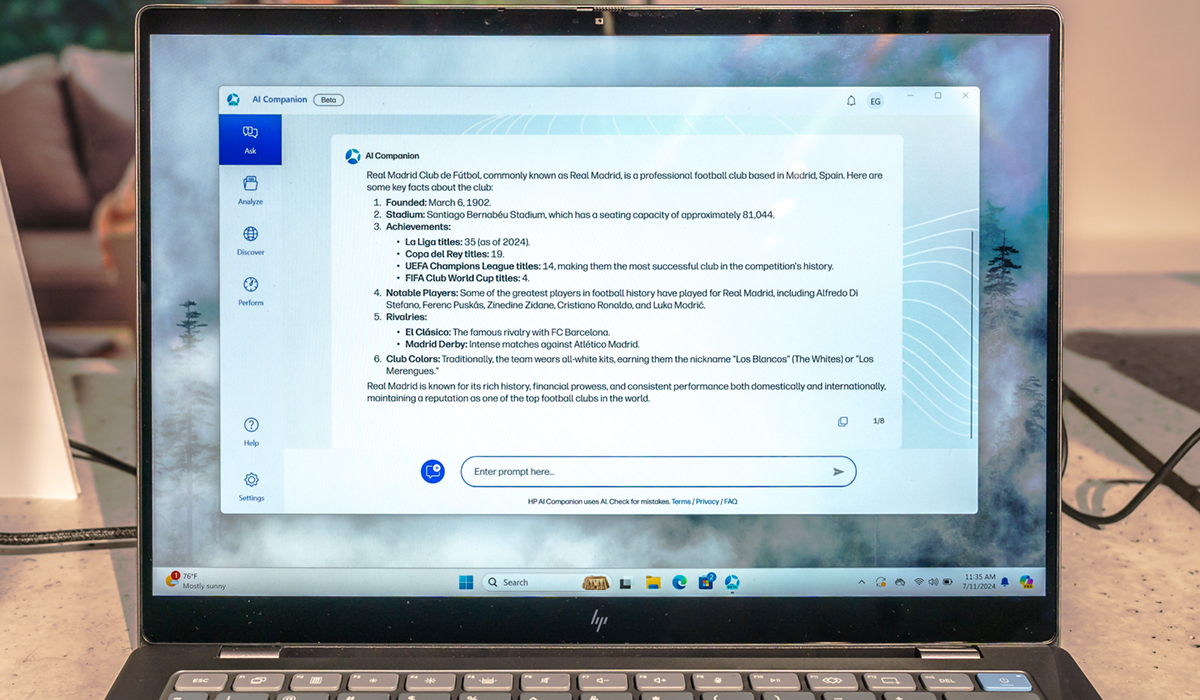
The true standouts, though, are the internal components running the device. It starts with the AMD Ryzen AI 300 Series CPU with Radeon graphics, along with a Ryzen NPU to handle the AI-enabled features available on the laptop. It’s rated for 55 TOPS (trillion operations per second)—higher than any other laptop as of this report. To pull this off, HP and AMD collaborated on the chip to optimize speed and performance.
TOPS will likely become an important metric for measuring AI performance in PCs. HP claims the OmniBook Ultra (through this NPU) can run Microsoft’s Copilot+ AI three times faster than current competitors. In practical terms, that means you would see AI bots respond quicker onscreen. It would also enable virtual backgrounds and auto-framing during video calls.
HP also says you can expect up to 21 hours of battery life for video playback and 13 hours for mixed daily usage. Solid numbers if they pan out, including the configuration options. You can opt for either 16GB or 32GB of RAM and storage between 512GB and 2TB. The OmniBook Ultra is slated to launch in Canada in September.
What HP AI Companion can do
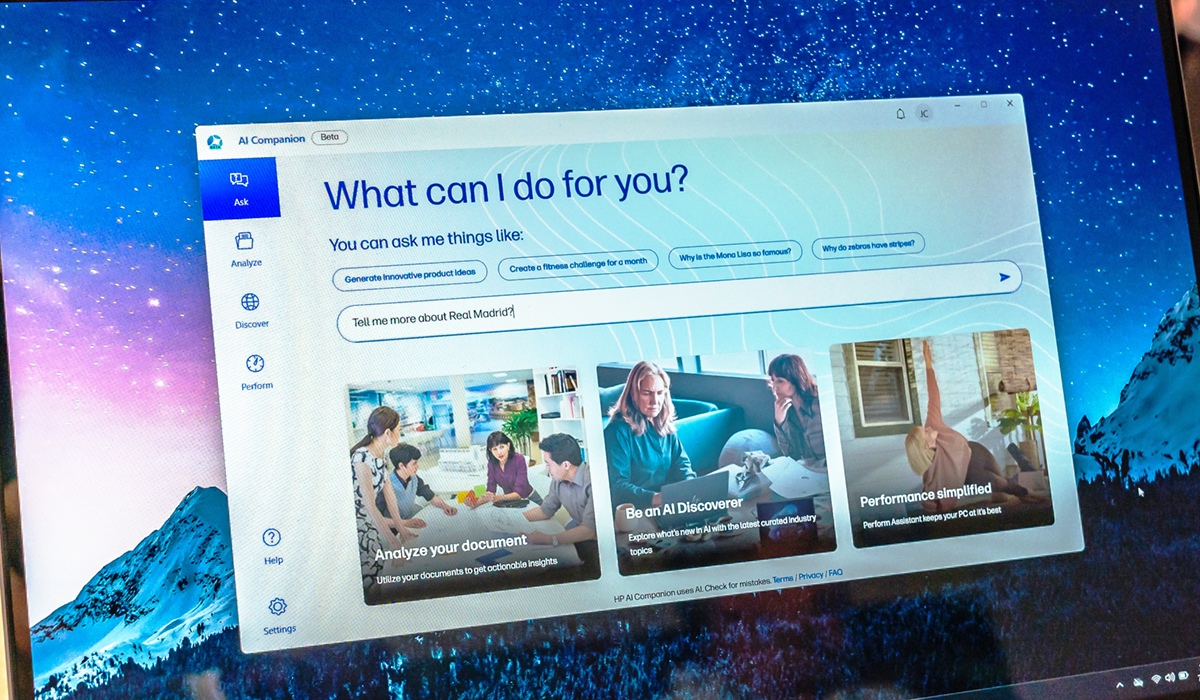
HP PCs with Copilot+ with 40-60 TOPS are able to run HP’s AI Companion application. This is an on-device AI platform, meaning it does everything natively within the machine rather than pull in information from the cloud. Thus, no internet necessary to ask it anything. In essence, you can look up a person, place or thing anytime, anywhere. It’s almost like doing a Google search without any connectivity.
It will dig deeper by knowing the files you have on the device, helping locate them or gleaning information from them. For example, it can take multiple related documents, amalgamate and create a full summary for all of them. It’s also capable of adjusting settings to optimize the PC’s performance based on open apps and tasks.
HP also wants to implement tech troubleshooting into its AI Companion to help diagnose and resolve issues that may come up. It’s not clear how deep this will go or how effective the AI will be in figuring things out. However, it provides a layer of knowledge available offline before reaching out to tech support.
The company is emphasizing privacy and trust as key elements to how AI will run on devices like the OmniBook 14 and OmniBook Ultra. That will go hand-in-hand with broader partnerships to boost productivity.
Third-party AI tools come into play
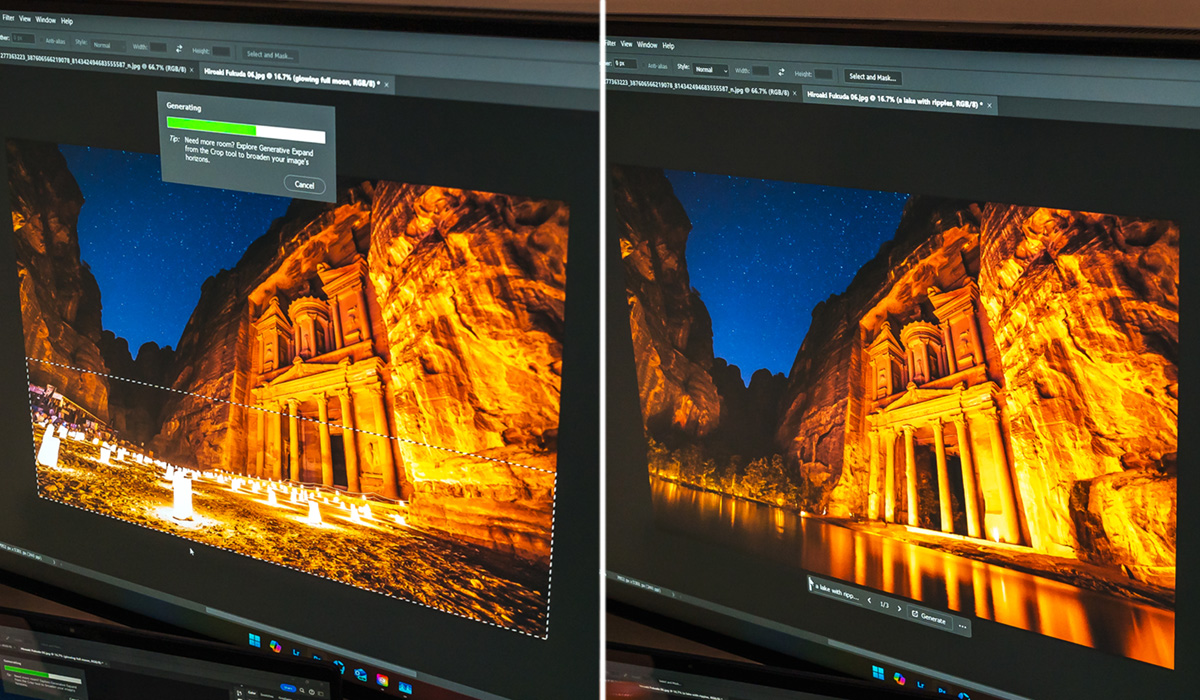
As part of the launch, some third-party vendors were on hand to demonstrate how AI can work better on compatible devices. One example that I’m already familiar with is how generative AI works on Adobe Photoshop and Lightroom, where you can either alter part of a photo, add something to it or remove something instead.
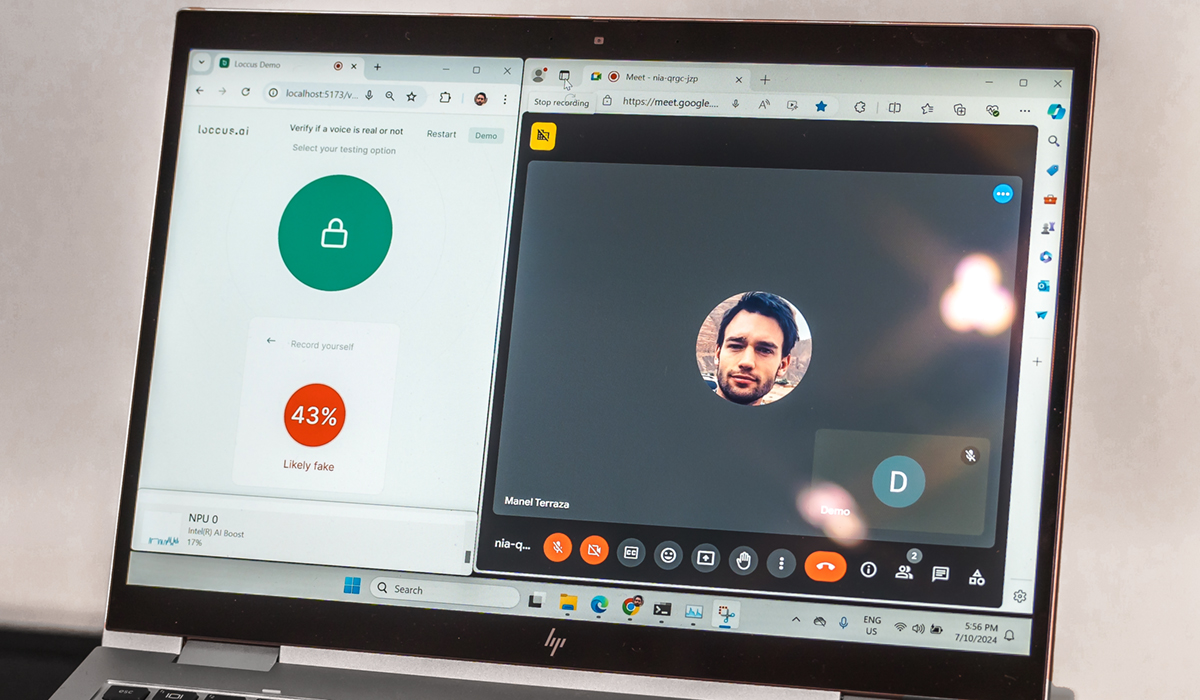
Loccus.ai uses proprietary voiceprint models to discover deepfake audio in real time, helping determine when a voice is authentic or synthetic. This would also run natively on the device and work no matter what audio is playing on the computer. For instance, if there’s a clip playing from a YouTube video or even during a call, it can detect whether the voice is human or not. It can also do this in selective edits too. If part of a speech or statement was edited to include AI-generated speech, the voiceprint should catch those particular moments.
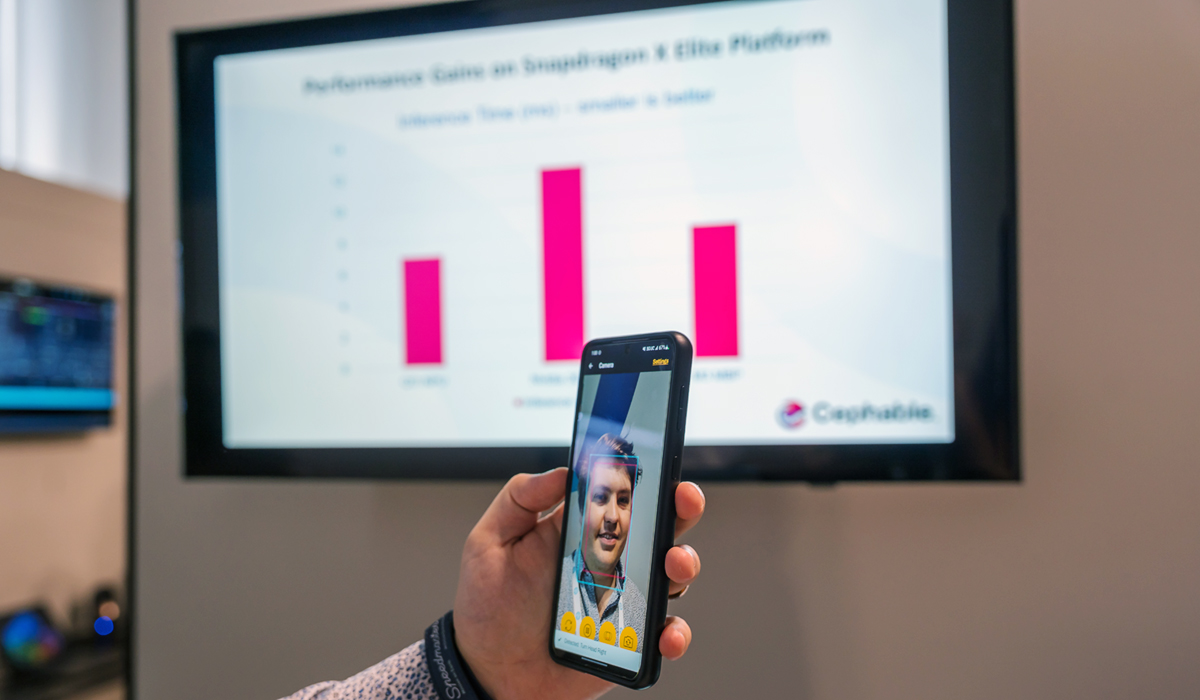
Zoom and Virtual Sapiens each have visual data present during video calls. For Virtual Sapiens, that includes coaching in real time, helping call presenters and participants make actionable changes in how they appear on camera. Its behavioral AI can read everything from posture, body language, facial expressions, and visibility during the call to improve communication skills. Zoom has its own AI Companion app that can summarize meetings and break them down by topic.
There was even an impressive example from Cephable where those with disabilities and impairments could control apps and games using their eyes and faces. In one instance, a man was able to do a presentation by moving slides through head gestures via smartphone. In another, a paralyzed individual competed in a game with a loved one by using mouth gestures as his controller.
Coming to an HP AI PC near you
HP didn’t reveal anything about future plans for the rest of its laptops, though made clear it will deploy its AI Companion in any computer that can run it. For now, you can get some AI use out of the OmniBook X 14, which runs on a Qualcomm Snapdragon X CPU. The OmniBook 14 and 14 Ultra bring AMD into the fold, with Intel likely to follow next. Check out all the latest Copilot+ PCs available now.




